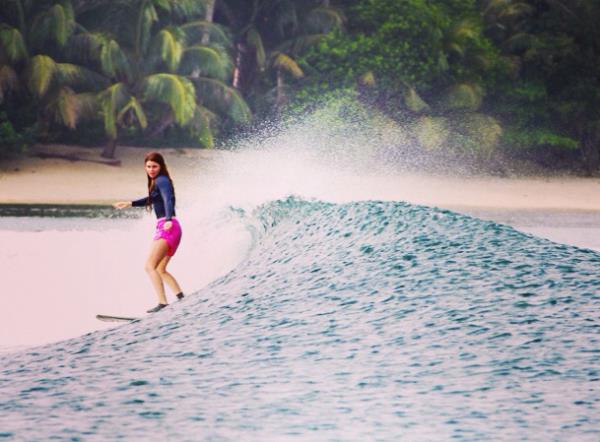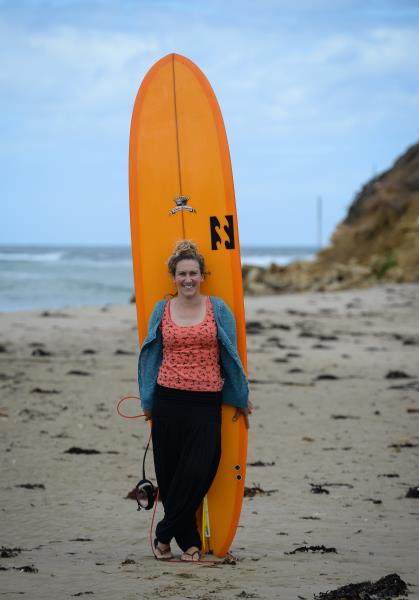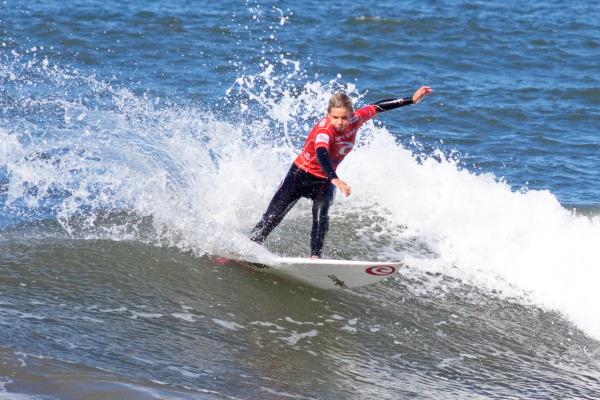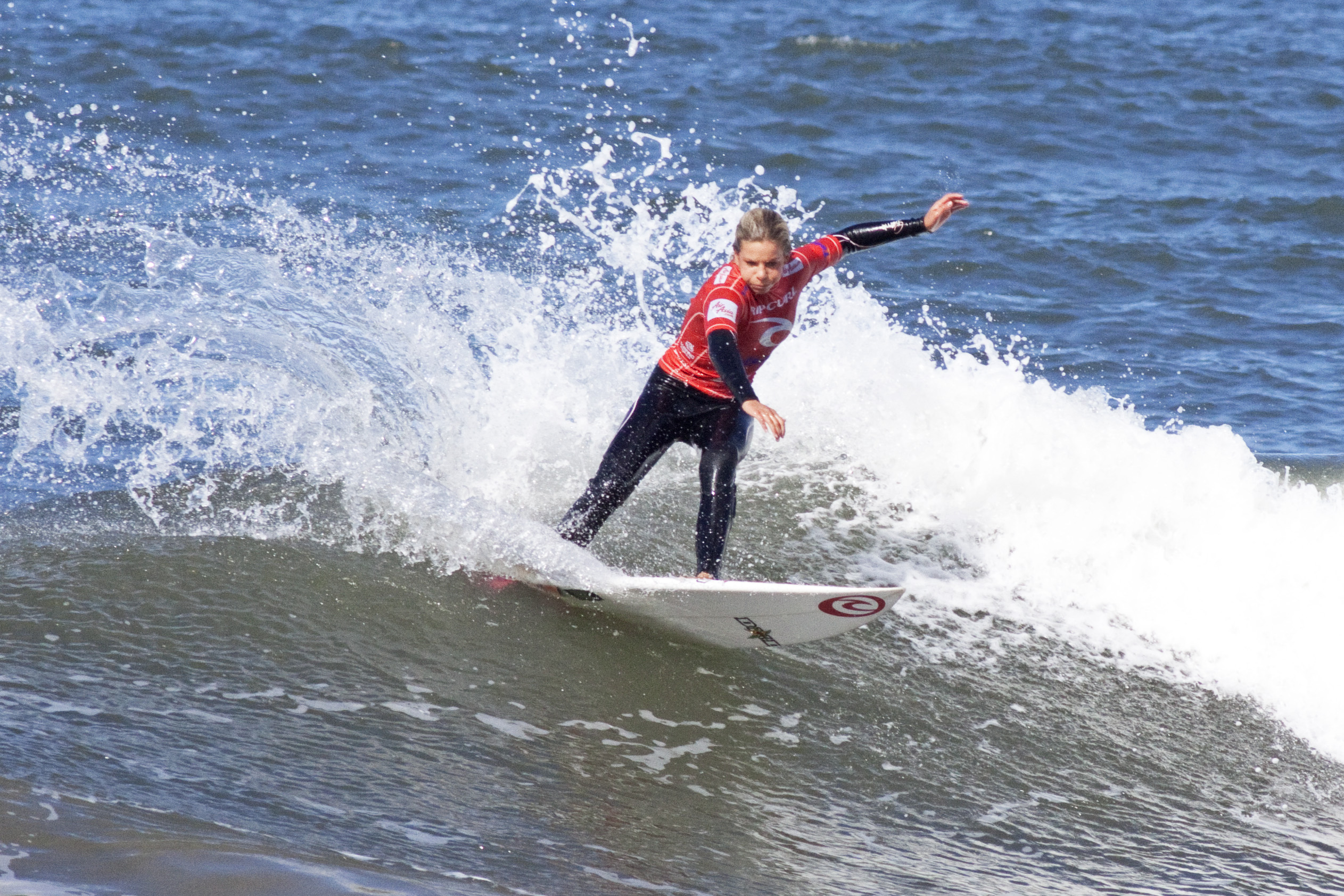The Surf Coast has long lured and nurtured champions, and the current complement of wave carvers is no exception. NOEL MURPHY catches up with a few of our best female riders.
 FUNNY how you never know just who you’ll run into out in the surf.
FUNNY how you never know just who you’ll run into out in the surf.
Trip over Georgia Kelly and you’d be forgiven for thinking here’s one more surf-addicted girl living the dream. But as with so many other surfers, there’s often a whole other story altogether – rock star, business pro, doctor …
In this case, you’d be tripping over an RMIT criminology/psychology undergraduate; one who hopes to move on to further studies in forensic science, maybe something in corrections support.
The bright young things out in the water along the Surf Coast know their surfing too, and don’t mind sharing their know-how.
Georgia’s been teaching the game to newcomers for the past three years, with Torquay Surf Academy’s Gally Galbraith.
“I started myself when I was about 10, Dad taught me,” she says.
“I’ve never done it competitively but it’s handy for making money while at uni.
“I love seeing the satisfaction on their faces when they get up for the first time, even if it’s just for a second or two – it’s really rewarding.”
That reward is all but guaranteed, too, which is a bonus. Students almost invariably get on their feet first lesson. Sometimes they return for a few more to get their skills up quicker.
“People come from everywhere — from Melbourne , locals and tourists from all over the world,” says Georgia.
“Most excited of them are probably tourists from Europe, they’re just excited to be in the water.
“We do a run-through of the stages on the sand and then we get them in knee-deep water just to start off.
“Then we do belly rides to get them comfortable and go through the process we did on the beach to get them on to their knees and standing up. The water is waist-deep when we get them standing.”
All good stuff, sharing the love. But what is it about surfing, the thrill of catching a wave, that keeps newcomers and veterans returning to the water?
“I guess it’s the adrenalin rush, like any sport,” says Georgia.
“But it’s unique in that it’s so subjective. Each wave is different and when you get a good one, that’s really special.
“So, yeah, it’s the adrenalin and a wave that’s really good, that’s really exciting.”
 ZOE CLARKE has grown up in the surf off Jan Juc but has been developing a liking for more exotic surf locations such as Hawaii lately.
ZOE CLARKE has grown up in the surf off Jan Juc but has been developing a liking for more exotic surf locations such as Hawaii lately.
It’s hardly unexpected. The girl’s a gun: 2012 Victorian Open Champion; 2013 Victorian under 18 State Champion; highest placed female Victorian on the 2014 ASP Pro Junior Tour.
And a World Tour wildcard spot under her belt after taking out the Rip Curl Pro Women’s Trials this year. Not bad going for a 17-year-old only now emerging from Year 11 and weighing her subject options for year 12 next year.
“I’m looking at psychology, history, English, not sure what else yet, I’ve done a Year 12 maths already,” she says. After that, she might look at journalism at tertiary level and, who knows, maybe work on a surfing mag later.
It’s funny the way things can pan out for a kid who fell in love with surfing at the age of four. Clarke has cut her teeth among the surf-mad locals and shaved the surf ever since.
“My dad took me out first but I was out by myself from an early age,” she says.
“It’s different to other sports where you need other people. It’s very individual and you can surf whenever you want. I think the best thing is that it’s different every single day – you never know what it’s going to be like when you go out.”
Clarke likes surfing waves like those on offer at Haleiwa these days. Like all champs, she’s indifferent to their size. The bigger, the better, basically – more things to do with them.
As a powerful role model, how does she suggest young girls approach the sport of surfing?
“I tell them do it for the right reasons,” she says.
“A lot of people, especially girls, do it because they want to look a certain way instead of doing it to enjoy and get the most out of it.”
 SHE MIGHT be a double Australian surfing champ but Jan Juc mum Emma Webb is extraordinarily down to earth.
SHE MIGHT be a double Australian surfing champ but Jan Juc mum Emma Webb is extraordinarily down to earth.
She’s also remarkably humble about her achievements, which as both Australian women’s longboard champion and Australian stand-up paddleboard champion, are considerable to say the least.
But Webb’s matter of fact about it all. She has two young kids and a family household to manage. There’s other stuff going on. So much, in fact, she’s been known to run off straight after a contest without being awarded her trophy.
Webb, in her mid-30s, is a relative newcomer to surfing. She took it up 15 years ago under the tender guidance of teacher husband Sam.
Living at Jan Juc, she smartly found herself surrounded by the area’s multitude of talented surfers flying under the radar.
“I reckon down here they’re not quite underground but it’s definitely understated how good they are,” Webb said.
“Up north, it’s all in the papers. In Victoria, all water sports are really low-key. It’s probably because of the weather – there are heaps of really talented surfers but they’re just not where the media and sponsors are.”
Webb says the high standard of local surfers, and the number of male surfers in the water, has helped her work her way up the chain.
“Surfing down here, you surf with lot of guys,” she says.
“For women or girls surfing regularly with guys better than you, you tend to rise to their level. When you’re around those people, it’s not so much thinking you’re good but more a case of if you don’t have limitations you just go in as hard as you can.”
Webb is also a fervent believer in the benefits of sport to kids.
“I think sport is awesome for kids. It gives them confidence, you don’t have to win,” she says.
“I started out swimming at eight. With sport, you know you have ability, it gives a lot of kids confidence in themselves – it can be anything, tennis, golf. Later in life I think they’re not so likely to get into drugs and drinking so much because they might be training or have a game the next day.”












